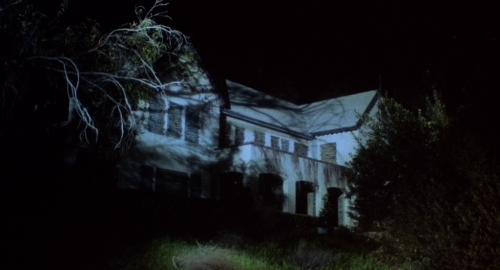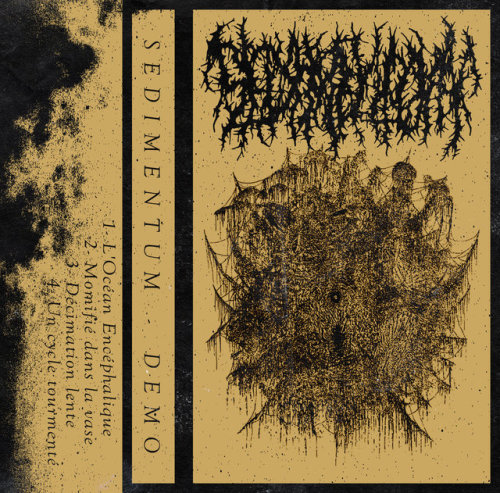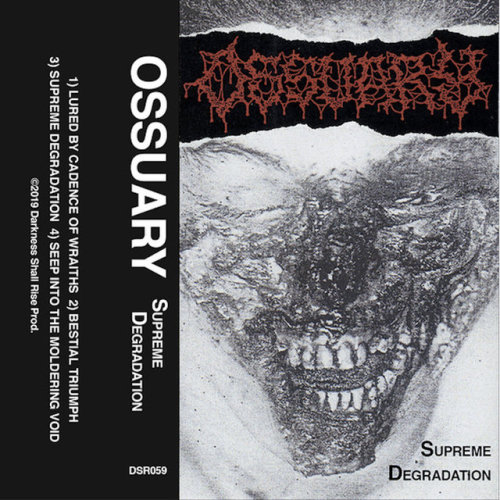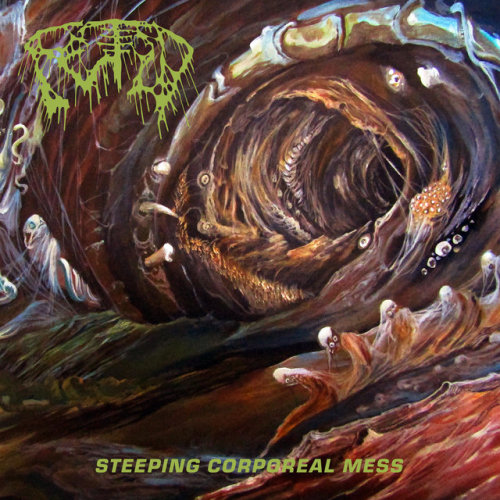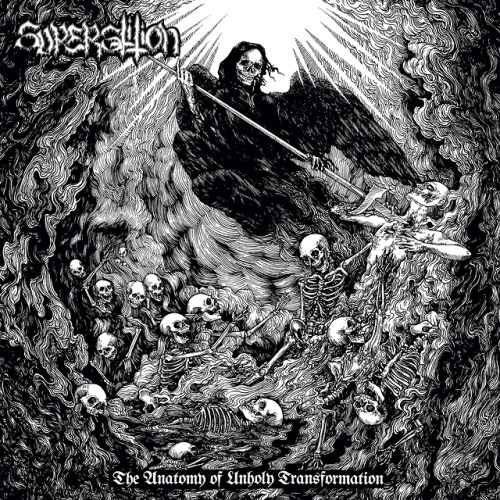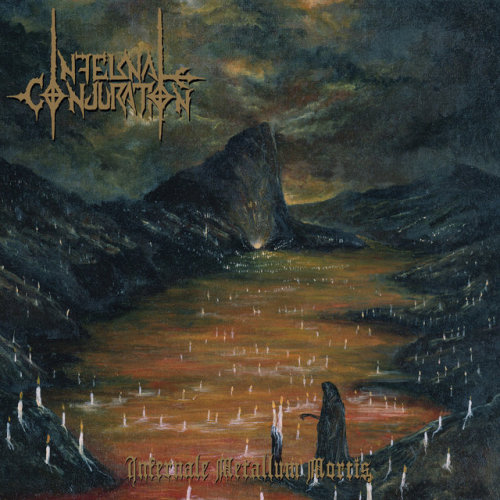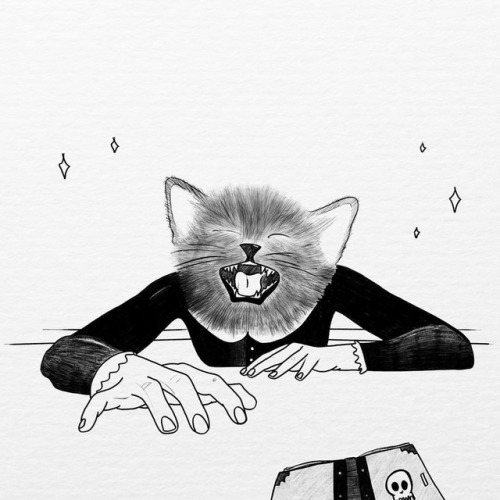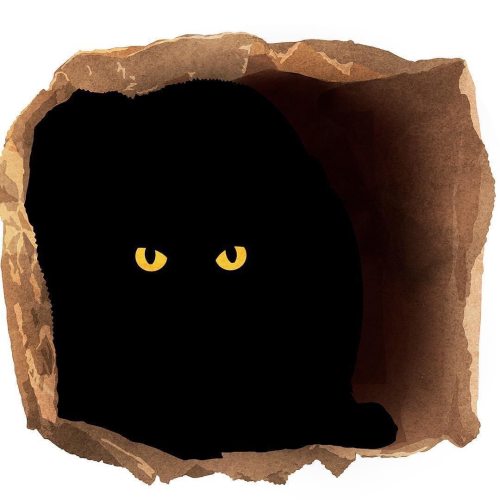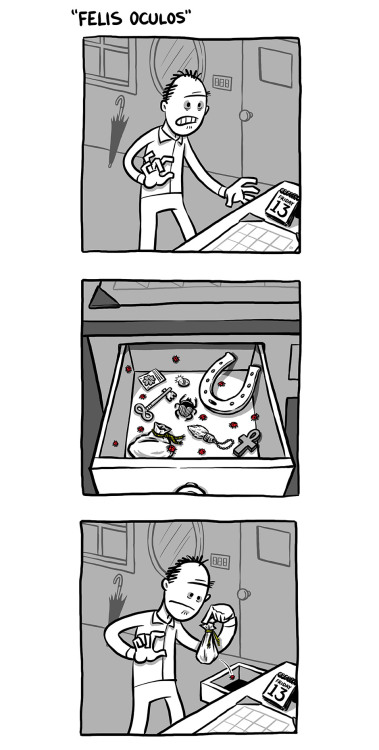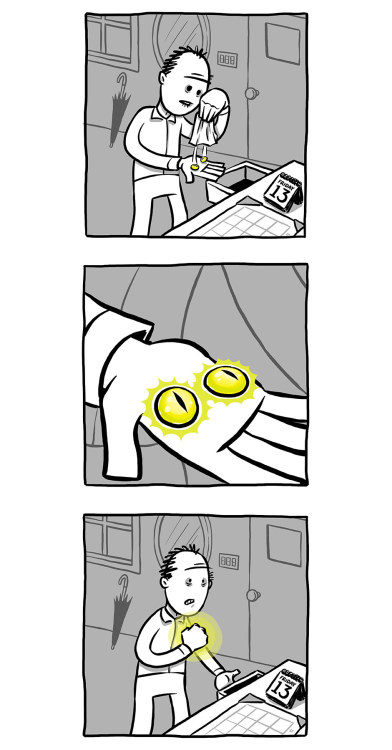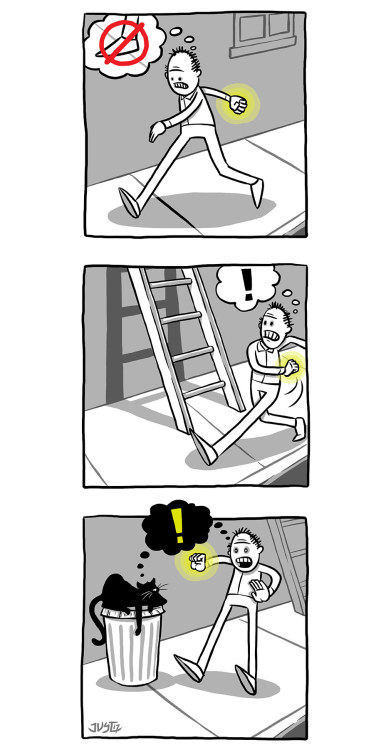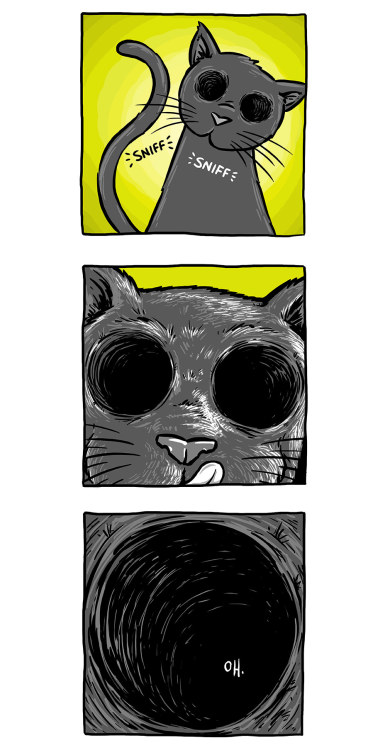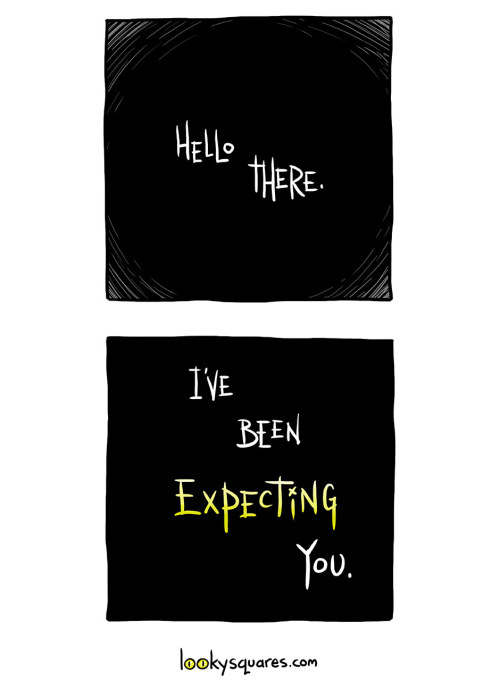#superstition
Sometimes I forget what a superstitious family I came from until I see something like white lilac blossoms in a home and my first reaction is “Taunting death during a global pandemic? The audacity!”
“When the new psychologist puts an end to the superstitions which have so far flourished with almost tropical luxuriance around the idea of the soul, he practically exiles himself into a new desert and a new suspicion. It is possible that the older psychologists had a merrier and more comfortable time.”
—F. Nietzsche, Beyond Good and Evil, §12 (edited excerpt).



Friday the 13th
Black cats, opening umbrellas indoors, breaking mirrors, standing under ladders, spilling salt…these Minneapolitans were testing their luck on Friday the 13th.
Pictured above: 1) Peggy the black spaniel has thirteen puppies on Friday the 13th. 2) A black cat poses by a calendar. 3)Floyd Chadwick is the 13th sailor to enlist on Friday the 13th. 4)Magician Russell Swann flouts superstition. 5)Members of the Junior Catholic League plan a Friday the 13th jinx party.
Happy Friday, May 13th!
Photos from the Minneapolis Newspaper Photograph Collection in the Hennepin County Library Digital Collections.
[Saint] Paul was denounced to the [Roman] authorities by owners of a slave-girl who had the power of predicting the future [due to the influence of a demon. Such soothsaying was not uncommon;] in the uncertainties of a pre-scientific age, any high-ranking official would have a staff of seers to predict the future for a price. Today we [effectively] still have them and they call themselves scientists, whether their predictions have a sound scientific basis or not. [Although legitimate science is praiseworthy and practically useful, we see the modern “demonic” aspect inevitably emerge when the knowledge gained by science is separated from God, being instead hailed as the result of human power alone, and used for trivial, selfish ends. Like in the pagan days of Rome, today individuals of popular esteem or rank will, almost religiously, consult the (often unprofessional) predictions of ‘science’ to guide and govern their choices. This superstitious obsession, and the power it brings, has become so integral to the lifestyles of so many that, when it is questioned– or removed, as Saint Paul did with the demon of divination– the result is striking. Idols do not fall quietly, especially not before Christ. Likewise,] when Paul silences this girl– and deprives her owners of their income– [in their fury,] they easily accuse him of other 'crimes’. These might be refusal to attribute divine status to the Emperor– [the next step up in idolatry. Whereas a pagan had no trouble promoting mortals to 'godhood’ and consulting spirits for hidden knowledge, the early Christians– still seen only as a Jewish sect– openly refused and rebuked such practices. Their faithful devotion to the One God, and declaration of His Sovereignty, was an automatic criminal sentence in the eyes of a vengeful nonbeliever– or even a misguided man of their natal faith, once the Christian declared Christ as God Himself! Thus] in his proclamation of the Gospel, Paul was caught between two [unavoidable and painful outcomes]: either he was beaten by the lictors for refusing divine honour to the emperor, or he was beaten by the Jews for granting divine honour to Christ. [Nevertheless, he– and all the faithful– stood undaunted.] Half-a-century [after Paul was so accused,] Pliny, as a provincial governor, challenges Christians to say ‘The Emperor is Lord’; they reply, ‘Damn the Emperor, Jesus is Lord!’
Dom Henry Wansbrough; Expounded Commentary on Acts 16:16-22
Happy 72nd Birthday to Stevland Hardaway Morris aka Stevie Wonder!! Please show some Bday Lve for singer-songwriter and musician, who is credited as a pioneer and influence by musicians across a range of genres, #StevieWonder ✨
#Saginaw
#Michigan
#TheJazzSoulOfLittleStevie
#ForOnceInMyLife
#WeCanWorkItOut
#HeavenHelpUsAll
#MyCherieAmour
#YouAreTheSunshineOfMyLife
#SignedSealedAndDelivered
#TalkinBook
#Superstition
#YouAreTheSunshineOfMyLife
#WhereImComingFrom
#EbonyAndIvory
#PartTimeLover
#Innervisions
#HigherGround
#LivingForTheCity
#DontYouWorryBoutAThing
#SongsInTheKeyOfLife
#IsntSheLovely
#TheWomanInRed
#IJustCalledToSayILoveYou
#MasterBlaster
#Superwoman
#RibbonInTheSky
#JungleFever
#Lately
#HappyBirthday
#YouWillKnow
✨ Kindly FOLLOW Our Pages @wonderwombman2 @wonderwombman
(DM For Our PROMO RATES)
(Click the Notification Bell to see our post first) ✨
https://www.instagram.com/p/CdgCMlHAbIe/?igshid=NGJjMDIxMWI=
Post link


Krampus
(An essay by Chinese sociologist Fei Xiaotong, written around 1943 or 44)
Accepting an invitation from the University of Chicago, I went there to work on my book “Earthbound China.” After I arrived, a secretary showed me to room 502 on the fifth floor of the Social Sciences Building and asked politely if it would do for an office. When I noticed the name “Robert Park” in the brass card-holder on the door, the alert secretary hurried to say, “I was waiting until you decided before putting your name up.”
“Don’t change the name. I like that one,” I told her. But she could hardly have understood why.
Robert Park had been my teacher. He came to Yenching University [in Peking in 1932] when I was an undergraduate there. Though I was just an ignorant student, I absolutely worshipped him—except for the old man’s perverse insistence on teaching at 7 a.m. and never missing a class or even coming late, which meant I had to skip breakfast to get there on time. For better or worse, his course determined the direction my life has taken in the ten-odd years since, and to him should go the credit or the blame. The founding father of the Chicago school of sociology, he maintained that sociology should take as its subject understanding human nature. Perhaps I liked him because he wanted me to read novels and not sociology textbooks. More than reading novels, he urged going and personally experiencing different kinds of life. Ten years later I still follow this teaching. On this trip to the United States, I had hoped to go hear his classes again. But I was busy with other things, and it was half a year before I got to Chicago, and the old professor had already gone south to escape the Chicago cold. And so it happened that I was put in his office.
This arrangement, whether accidental or not, was full of meaning for me. I had been an unremarkable student in Professor Park’s class, a matter for some regret, and ten years later, though still without achievements, I remained eager for a word of praise from the teacher. I was secretly happy that, sitting in the chair he had used, I would surely absorb something of his spirit, and hoped to write a book that would compensate for my earlier failure to be worthy of the pains he had taken in rising so early all those mornings to teach us. There is here a sort of historical causal connection: because of a past memory the present takes on a significance greater than anything in the current situation. My strong desire to have the name left on the door arose out of a need for concrete, living, moving history. I felt that if the nameplate, the old books lining the walls, even the air in the room were not disturbed, then, surrounded by this lingering past, perhaps in a few months I would see a draft of “Earthbound China” on the table. But if these were disturbed, all might be lost.
This, in fact, is the “tradition” of which I have written in an earlier article. Tradition need not be an obstacle to innovation. True, it has its bad side. When old people, with the various privileges and respect that have been accorded them in the past, prevent any change in the status quo, that is a bad aspect of tradition. But it is also undeniable that everything new is born out of that which is old. These ties of kinship should not be obliterated, and recognizing them gives to the connection between old and new the significance of succession and continuity. If we can develop this kind of feeling for history, I believe the world and mankind will be richer. When we go on a trip into the country, we can enjoy the scenery merely as a present phenomenon; if we have left there earlier memories worth recalling, this can bring on a pleasant nostalgia; and if this is a historical site, our feelings arc further enriched because of what others did there. People do not live only in the here and now; life is not just a string of moments. We need history, for it is a wellspring of inspiration. When we take tradition in this way, that is another aspect of it.
Sometimes I think the world is very strange. We in the Orient accept tradition, but what we seize on is its bad side. The West seems to want to disregard it, with the result that the good side is lost too.
Of course, it is not entirely true that Westerners purposely disregard tradition. For the most part, they all know much more about the history of their own country than I do. Every child who goes to New York has to go gaze at the huge Statue of Liberty and then on the way back visit the church that George Washington frequented. In Washington, D.C., there are the hundred-foot-tall Washington Monument, the Lincoln Memorial, and now the Jefferson Memorial. Buildings just a few hundred years old are preserved as historical monuments. On a personal level, Americans keep diaries and write autobiographies. I have elsewhere described how on Thanksgiving the year before last my host brought out a big pile of his fathers diaries. At Professor Redficlds house, Mrs. Park especially wanted me to see the pictures of Redfield ancestors in a corner of the living room. On Professor Ogburns staircase wall were neatly lined up generation after generation of ancestor portraits. Perhaps because at a dinner party I had once expressed the view that Americans lack any feeling for history, all the friends I came into contact with were particularly anxious to correct my misapprehension by showing me their concern for their ancestors. All this is true, but still I feel their regard for tradition is to a greater or lesser extent conscious, intellectual, and artificial. It is not the same as ours. The reason I feel this way is that I have found Americans do not have ghosts.
When tradition is concrete, when it is a part of life, sacred, something to be feared and loved, then it takes the form of ghosts. This is equivalent to the statement by Durkheim that God is the representation of social cohesion. As I write this, I feel in my heart that Chinese culture in its essence is rather beautiful. To be able to live in a world that has ghosts is fortunate. Here let me relate some personal experiences.
When I was a boy, because the family was in decline … we lived in a big old building of which at least half was closed off awaiting uncles who seldom came home, and in another part of which were dark rooms that had never seen sunlight. … In these dark and desolate rooms, there were more places for ghosts than for people This environment was already sufficiently frightening, but in addition not a day passed when people did not talk of ghosts to scare or amuse us children I am not exaggerating when I say that to a child like me brought up in a small town, people and ghosts were equally concrete and real….
Because I grew up half in a world of ghosts, I was particularly interested in them. Gradually my fear changed to curiosity and then to attraction, to the point that I even feel a little sorry for people raised in a world without ghosts. The thing that felt most strange to me during almost a year of living in America was that no one told me any stories of ghosts. I do not want to overpraise such a world, but I will admit that children who grow up in it are more comfortable than we and do not have to live with fear in their hearts all day long. But perhaps there is a heavy price for this, a price I would be unwilling to pay.
The beginning of my gradual change in attitude toward ghosts occurred the year my grandmother died. One day not long after her death, I was sitting in the front room looking toward her bedroom. It was almost noon. Normally at that time Grandmother would go to the kitchen to see how the lunch preparations were coming along, soon after which lunch would be served. This had been a familiar sight for me, and after her death the everyday pattern was not changed. Not a table or chair or bed or mat was moved. Every day close to noon I would feel hungry. To my subconscious mind the scene was not complete without Grandmothers regular daily routine, and so that day I seemed to see her image come out of her bedroom once more and go into the kitchen.
If it was a ghost I saw, it was the first one in my life. At the time I felt nothing unusual, for the scene was so familiar and right. Only a little later when I remembered that Grandmother was dead did I feel upset—not frightened, but sad the way one feels at a loss that should not have occurred. I also seemed to realize that a beautiful scene, once it had existed, would always be. The present loss was just a matter of separation in time, and this separation I felt could be overcome. An inextinguishable revelation had struck; the universe showed a different structure. In this structure our lives do not just pass through time in such a way that a moment in time or a station in life once past is lost. Life in its creativity changes the absolute nature of time: it makes past into present—no, it melds past, present, and future into one inextinguishable, multilayered scene, a three-dimensional body. This is what ghosts are, and not only did I not fear them, I even began to yearn for them.
I cannot get used to people today who know only the present moment. To take this moment as [the sum of] existence is a delusion. Our every act contains within it all the accumulated history from the beginning of the universe right down to the present, and this every act will determine the destiny of endless future generations. If the present moment, fragmentary, abstract, false, is taken for life, this life will necessarily be shallow and base and even empty—since the moment cannot last, one might as well indulge oneself and revel, for when the instant is gone what is left?
American children hear no stories about ghosts. They spend a dime at the “drugstore” to buy a “Superman” comic book. This “Superman” is an all-knowing, resourceful, omnipotent hero who can overcome any difficulty. Let us leave aside the question of what kind of children this teaching produces; the point worth noting here is that Superman is not a ghost. Superman represents actual capabilities or future potential, while ghosts symbolize belief in and reverence for the accumulated past. As much as old Mrs. Park, trying to lessen the distance between East and West, might lead me over to the corner of the living room to look at faded photographs, it was the Redfields little boy who showed me the heart of American culture, and it lay in Superman, not ghosts.
How could ghosts gain a foothold in American cities? People move about like the tide, unable to form permanent ties with places, to say nothing of other people. I have written elsewhere of the gap between generations. It is an objective social fact that when children grow up they no longer need parental protection, and the reflection of this in the family is childrens demand for independence. Once when I was chatting at a friends house, his daughter sat with us chain-smoking. The father happened to remark that it was senseless to smoke like that, but she paid no heed and afterwards told me that she was eighteen, it was none of the old mans business, smoking was her own affair. Eighteen is an important age for a girl; after that her parents need not support her, but neither can they tell her what to do.
I also know an old professor whose son teaches in the same university as he but lives apart from him—which might be all right, but he seldom even visits. During the war they could not get a maid and it made my heart sick to see the professors wife, old and doddering, serving a guest coffee with shaking hands.
When I was staying at the Harvard Faculty Club, I noticed sitting at the same table every morning a white-haired old gentleman who lived upstairs and who from his looks was not long for this world. Whenever I saw him I felt outraged. He must have been a famous professor who had educated countless people and worked hard for society. Now old and failing, cast out of the world into this building, without relatives even to care for him much less give him pleasure, he might as well have been dead. One day he said softly to the waitress, “I don’t know if I’ll be able to make it down the stairs tomorrow.” Afterwards I asked her where his home was, but she did not know the answer and only shook her head. In America, when children grow up they have their own homes, where their parents are mere guests.
Outside the family there is certainly much social intercourse, but dealings with people are always in terms of appointments. On my office desk is an appointment calendar marked in fifteen-minute intervals with a space for a persons name beside each. Apart from business there are various kinds of gatherings, but if you go to one you will find it is no more than social pleasantries: a few words with this person, a few words with that one—it is hard even to remember their names. I cannot say all Americans pass their lives like this. But I once asked a fairly close acquaintance how many friends he had whom he could drop in on at any time without a previous engagement. Counting on his fingers, he did not fill one hand. In fact, unless they have business or an engagement they spend most of their time at home, where they don’t much like to be disturbed by guests. At any rate, friends warned me not to go barging in on people all the time.
With interpersonal ties like these, naturally they seldom see ghosts after death. Moreover their movements are so easy and they have contacts with so many people, that there seldom comes about the kind of relationship I had with my grandmother, living interdependently for a long time, repeating the same scenes, so that these scenes came to seem an inalterable natural order. Always being on the move dilutes the ties between people and dissolves the ghosts.
As to attachments to places, that is another thing that made me uncomfortable in America. Not the beds and mattresses, for I believe there are none more comfortable than those of the Americans, but the constant moving around that year was the cause of my discomfort. I visited many places, but when I think of them now it seems I went nowhere, for I felt no particular attachment to any place as all were alike, differing only a little in the height of the buildings. The cities are all more or less the same, at least for a traveler: you get off the train and your bags are taken by a black man who everywhere wears the same type of cap (you may not encounter this kind of man, but you will not encounter any other); you take a similar taxi to a similar hotel—no matter what hotel, if you have stayed anywhere once, you will not feel it unfamiliar. The hotel rooms are all comparable, some bigger and some smaller, but none lacking a bathroom, a cold-water tap, a Simmons mattress, and nice stationery and envelopes. Since it is the same everywhere, you can never take away a particular impression from any hotel.
Hotels are not exceptions; it is basically the same with homes in American cities. Moving house is no more difficult than changing hotels; a phone call is all it takes. Move here, move there—the houses are about the same. In New York I thought of renting a house and visited ten possibilities in succession. In the end I said to the friend who was accompanying me, “Why bother to see each one? Why not draw straws?” Moving here and there dilutes peoples ties with houses.
Whenever I return to my native place, I go to see the house I lived in as a child. I have lots of questions about the tung tree and the loquat tree; the tung tree still has my name carved on it. In London, where people do not move so frequently, I still remember where I lived on Lower Station Road and Ridge Avenue [?]; while I was in the United States I heard that the old buildings there had been bombed, and it made me feel bad for several days. In America, at least for me, no house has yet produced such a feeling.
I cannot get used to the way lights illuminate all the parts of a room either. Living in such rooms gives you a false sense of confidence that this is all of the world, that there is no more to reality than what appears clearly and brightly before your eyes. I feel the attitude of Westerners toward the unknown is very different from that of Orientals. They think of the unknown as static, waiting for people to mine it like an ore—not only not frightening, but a resource for improving life in the future. They are very self-assured. We Orientals feel some measure of reverence for the unknown; our reverence for fate makes us content with our lot, makes us aware of human limitations, and keeps our eyes fixed on the humanly attainable. I cannot assert that this attitude is ultimately due to the form of the houses we live in as children, but I believe that my own early feelings of uncertainty toward the big kitchen and the back garden and my fright toward the closed-off rooms have still not dissipated, but only expanded into my view of the universe. If many people in traditional China had similar experiences, then these experiences may have determined the basic structure of our traditional attitudes toward people and things.
In a world without ghosts, life is free and easy. American eyes can gaze straight ahead. But still I think they lack something and I do not envy their lives.
M. H. Boroson here. I don’t agree with everything in this piece, but I find it fascinating. I used a passage from it at the opening of The Girl with Ghost Eyes, and I wanted to share the rest of Dr. Fei’s brilliant essay.
more heat from 2019. first half of the year is done, some exciting things coming in July and August
Post link

Happy black cat appreciation day Op: @witchwandering
MUSEUM SECRETS: Toad Vaccines and Magical Jewellery

In today’s episode of our Museum Secrets podcast, join Curator Matthew Winterbottom as he explores ancient beliefs about disease testing and vaccines, through our collection of toadstone rings.
These bizarre pieces of jewellery have a lot to tell us about the human effort to find hope in the face of illness and uncertainty, even when it involves the strangest superstitions. And at the end of the day, it turns out that toadstones have nothing to do with toads after all…
Listen here or wherever you find your podcasts: ashmolean.org/museum-secrets
Thank you LORD for Stevie Wonder! Superstition just the right song to get me out of this random Monday morning funk. Time to start another workgrind son. #steviewonder #superstition #legend #uplifted
Post link
Little magpie I see so many of these guys everyday and the rhyme gets stuck in my head (and once I finished painting I got superstitious and sketched a few more magpies just in case )
#magpie #bird #painting #acrylic #femaleillustrator #instaart #illustrator #illustration #illustratorsoninstagram #traditionalpainting #nature #drawing #superstition #plants #illo
Post link
I’ve been trying to find a difference between religion and superstition, and I’m not satisfied with the results.
Religion can be simply defined as the belief and worship of a God or gods. On the other hand, a superstition can be defined as a belief in supernatural influences or a practice based on this. (x)
Since god is definitely a supernatural influence, that does not convince me. Also, religion absolutely has practices based on beliefs. Lots.
What it boils down to for me is, “It’s religion because I say so,” or semantics.
Thoughts?
‘Superstition’ is essentially a label we put on beliefs that we don’t see as legitimate; in the perjorative sense, there is no single way to define it; all religions can be superstitious to an atheist, for example.
But I have seen some anthropologists apply the label ‘superstition’ to a belief or behavior that in seems to contradict the worldview that the person performing or expressing the behavior otherwise professes.
It could be considered superstitious for someone who denies that objects have spirits to pat the hood of their race car and whisper something sweet to it before a big race, for example; but if someone professing that all things, even inanimate ones, had spirits, then this wouldn’t be superstitious under this definition.The first bit sounds a lot like “because I say so”. The second bit is interesting, but could it be that people performing superstitious acts only claim that they don’t truly believe? Why would they whisper to a race car if they didn’t believe on some level that it can hear them?
Well, you’re absolutely correct; it is very much ‘because I said so’ logic. “In my noble and solemn religious rite the bread and the wine on the altar becomes the literal Body and Blood of my God, but your absurd belief that reciting from your silly book is in some sense a participation in the monologue of your fake god is superstition.” Because I said so. It’s a term meantto denigrate other people’s beliefs.
As for the second definition, well, two possible responses; first, I think people do things all the time that they don’t actuallybelieve. I don’t reallybelieve that printers actually fail more frequently the morning of a paper’s deadline; and yet… there’s always that little part of me that “knows” if I wait until the last moment to print it out, that course of action will end in disaster. Which, you know, isn’t true. It’s not actually more likely to fail because I need it to work. But there’s some sneaking suspicion (some sneaking superstition) that causes me to act as if that were to case.
But that’s not really what I was talking about, anyway; what I meant is that most religious ideologies work along a certain kind of internal logic; and sometimes we believe things that directly contradict that sense of internal logic. And that could be considered a superstition. The race car drivers in my example could both really believe that ‘being nice’ to the car somehow helps them in the race. But that belief doesn’t make sense in the broader psychological framework that the first race car driver is claiming to be working under. “Objects don’t have personalities, but I talk to my car like it’s a person” vs. “Objects have personalities, and I talk to my car like it’s a person.”
Hopefully that clears up what I meant a little?as an academic folklorist i can confirm this, and will add that due to exactly this– that “superstition” is inherently derogatory, othering, and difficult to define in an objective way– we generally don’t use the term anymore. we lump it all under the more neutral concept of “vernacular belief”, which also includes a lot of more overtly religious beliefs.
Meeeeeehhhhh ✨
⠀⠀⠀⠀⠀⠀⠀⠀⠀
Day 2 of #inktober and #mabsdrawlloweenclub Today’s prompt is black cat
⠀⠀⠀⠀⠀⠀⠀⠀⠀
@mabgraves #illustration #drawing #magic #witch #witchcraft #halloween #crafty #magick #potion #spells #grimoire #crystalball #mickeemariee #galaxy #witchy #sketch #cat #catsofinstagram #kitten #kitty #superstition #stars #blackcat #spellbook #scary #spooky
https://www.instagram.com/p/Bocs5MWlZZ0/?utm_source=ig_tumblr_share&igshid=15lnhlyyxz1f6
Post link
Black Cats, Beware!
To all black cats, please listen keen!
Do fight the urge to see, be seen.
Tonight, avoid all humans mean.
My dears: Stay in on Halloween!
Resist the call to go outside!
Best inside your house to hide!
Resist the siren call of night
And ponder on the firelight.
Sit by the hearth and warm your toes,
Whilst evil comes and evil goes.
Resist temptation on this night.
Avoid a dark, nightmarish fright!
Your human knows to keep you safe.
Against her will, please do not chafe!
Curl up beside her, let her know
There’s no place else you’d rather go!
To all beloved felines black,
Stay safe this night and watch your back!
For Halloween will soon be o'er,
And you are safe for one year more!
– Melissa A. Herod
_____________________
>>Artwork:Linnea Design
Post link
May 1st
Wake up early, right before the sun rises, and wash your face with the morning dew for beauty and health.
I was on the phone with my mom today and my palms started itching really badly. She told me that’s a sign that you’re about to come into money.
Not 30 minutes later I accidentally ripped a $5 bill in half trying to pay for my chicken sandwich at Sonic and then hopped the curb trying to get out of the drivethru.
I don’t know what I’m about to come into, but something tells me it’s not money.
“long time no see.”
HAPPY FRIDAY THE 13TH! go adopt a black cat today!
“heeeeey those are mine.”
Post link
Silly Thing

